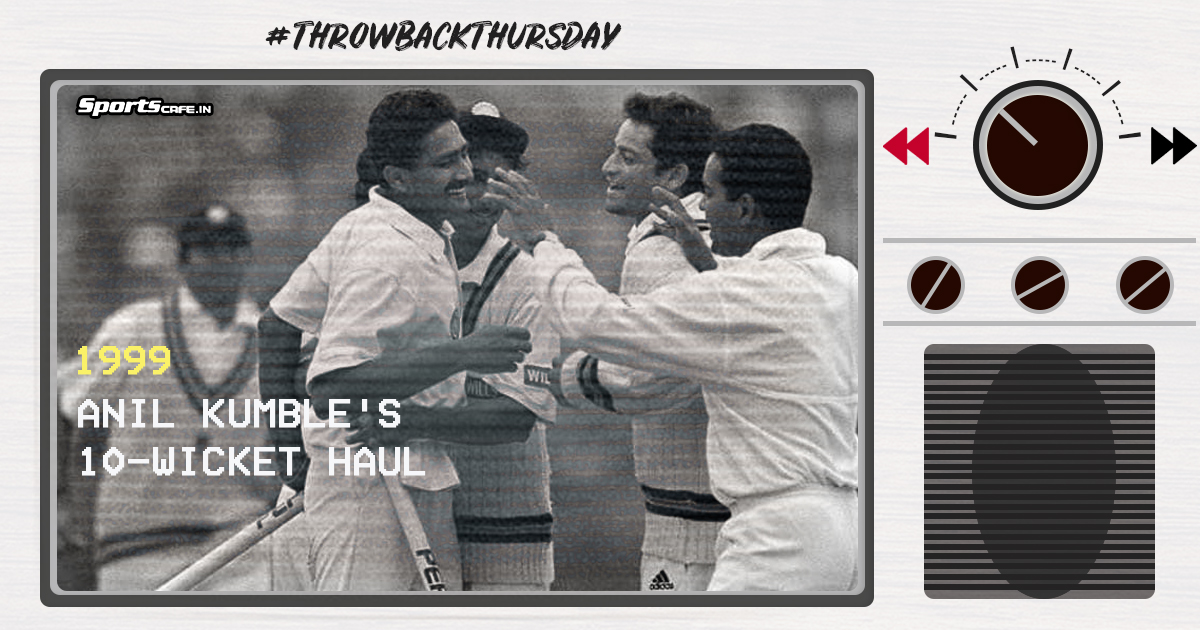Throwback Thursday | Anil Kumble’s Perfect 10 against Pakistan

Cricket wouldn’t have been half fun if not for these moments - something that shaped the way the game has been played and viewed. Welcome to 'Throwback Thursday', where we recollect a moment in history, and in this week’s edition, we look at Kumble’s Perfect 10 - a feat that transcended time.
It was the second innings of the Delhi Test and two fine innings from Sadagopan Ramesh and Sourav Ganguly had already put India ahead in the Test. A colossal total of 420 in front of them to be chased down, Pakistan were already staring at defeat. The memories and leap of honour in Chennai seemed like a thing of the past. And then ran in Anil Kumble, one of the greatest Indian match-winners, with the deliveries bursting like balloons upon the slightest hint of a crack. Pakistan were clueless - the effervescent charm of Shahid Afridi had gone for a toss, Ijaz Ahmed left wondering when this 'c Dravid b Kumble' phenomenon will end and Inzamam-ul-Haq saw his stumps cartwheeling in a spin motion that was so characteristic of Kumble.
To understand the significance of the great performance, it was necessary to see the relationship between two countries from a socio-political standpoint. The infiltration of Pakistani soldiers disguised as Kashmiri militants into positions on the Indian side of the Line of Control and the subsequent Kargil War that broke out in the next month made it a point for the ultra-nationalistic parties to have a campaign so strong that it threatened to break the cricketing relations between two countries. But it was surprising in a way for the kind of adulation the Wasim Akram-led side had got in just the previous game in front of the Chennai crowd. It was a moment in cricket history that moved the sport from its usual framework and established the very essence of it by carrying it beyond the confines of nationalism.
In Chennai, the game was a classic topsy-turvy ride. After being bowled out for 238 on the first day, Pakistan restricted India to 254. A Shahid Afridi masterclass threatened to take the match away before Venkatesh Prasad spearheaded a great collapse, sinking Pakistan from 275 for 4 to 286 all out. Sachin Tendulkar was the last hope and he battled hard in the fourth innings, but the heat and humidity of Chennai sapped the energy out of him, and a hopeless India lost the game by 12 runs, losing the last four wickets for four runs. Things have been sad for the Indian team dressing room but the Chennai crowd rose on their feet to applaud, Pakistan got the cue and joined them for a lap of honour. It was the stunning turning point in the series, especially after the Indian fundamentalists threatened to disrupt the tour.
The loss had triggered India too, with the caravan reaching Delhi. The political embroilment coupled with India’s plans to momentise Pakistan's first tour to India in 12 years probably ensured a fightback. Playing only his second Test, Ramesh scored a valiant 60, defying Akram and Younis, with Mohammed Azharuddin for company. After being all-out for 252, they stopped Pakistan below 200 and another Ramesh innings ensured the visitors had a mountain to climb, with 420 rocks to defy. Was it easy? Certainly, it had never happened before in Test history and it was not going to happen in front of a boisterous Sunday crowd in the national capital.
As Rahul Bhattacharya, in his book “Pundits of Pakistan” wrote, “Sport is able to sum up life, able to strip it bare and put it under a drama-filled magnifying glass. And through this magnifying glass, we are able to see ourselves, vividly, able to see, like they sometimes say of the arts, our condition.” Each line held true for the Indian fans that day present at the Kotla and countless others at their living room, clubs, pan shops and rooftop arrangements, as Kumble dismissed Shahid Afridi. One after another, the line to pavilion became a Kumble entity, with hardly anyone squabbling for the ultimate prize for a bowler, with only Englishman Jim Laker having the distinction.
After having taken the first six wickets, Kumble bowled non-stop in the second session - sniffing a chance but was not thinking of anything as such - but an injured Saleem Malik provided a chance. Pakistan were seven down now and Kumble was at touching distance of making history. The crowd had gone boisterous, a snake charmer played his traditional pipe outside the ground, the shouts of "Pakistan hai, hai" were deafening and it all boiled down to Wasim Akram - the only able batsmen in Pakistan’s tail.
“Nobody had to come and tell me to not take that remaining wicket. Anil had been bowling well and he was on the verge of a record and it was just a unanimous decision. I had to bowl about two to three overs from the other end,” Javagal Srinath later recounted in an interview with Cricinfo.
Akram was stoic at one end, but the Mushtaq duo of Saqlain and Ahmed pressed the panic button way too early, which made way for Waqar Younis. The game was already lost with Kumble going for the historic feat. It was going to be an emotional triumph against their great arch-rivals on a pitch that had to be repaired after it was vandalised by members of a political party. Like it was prepared for Kumble, he was having the time of his life when the ball beckoned.
Wasim Akram was on strike, the close-in circle was filled, with anticipation, of course. When Kumble ran in to bowl, there was pin-drop silence. And everything changed for Kumble and India after that.
Welcome to a moment in history.
